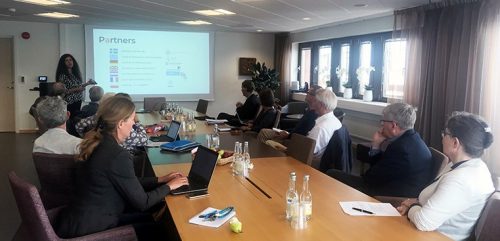Founded in 1739, the Royal Swedish Academy of Sciences is an independent, non-governmental organisation which enhances the status of the sciences and their influence in society by promoting science of the highest quality. While involved in many outstanding endeavours, the academy is probably most broadly known, internationally, for its role in awarding the Nobel Prizes in Physics and Chemistry and Sveriges Riksbank Prize in Memory of Alfred Nobel for Economic Sciences. The members of the academy are organised in ten subject categories or classes, one of which is the “class for humanities and for outstanding services to science”. On Wednesday 22 August 2018, HB had the privilege of hosting a visit by twelve members of this class as part of which Nasrine Olson gave a presentation of the SUITCEYES project as a main point in the day’s programme.

The presentation included an overview of the project, the consortium, and the most recent research results, while at the same time highlighting issues of deafblindness. An overview of the research in the area of deafblindness was also included, indicating that the research and related technological solutions for people with deafblindness remain limited. The presentation then revolved around how SUITCEYES brings together various competencies, research areas, and organisations (both academic and non-academic) in addressing this societal challenge. This highly competent group of visitors/professors, with a variety of backgrounds from linguistics, psycholinguistics, cognitive science, theoretical philosophy, ethnology, political science and more engaged with the topic by follow up questions and interesting discussions after the event. Even suggestions for new contacts were made which were followed up soon after the event. It was valuable to discuss the project and related issues with this group, and receive insightful feedback, by itself. However, due to the role of this organization in moving science and policy forward, we hope that introducing the group to the focus area of the project, will also result in other longer-term added value.
